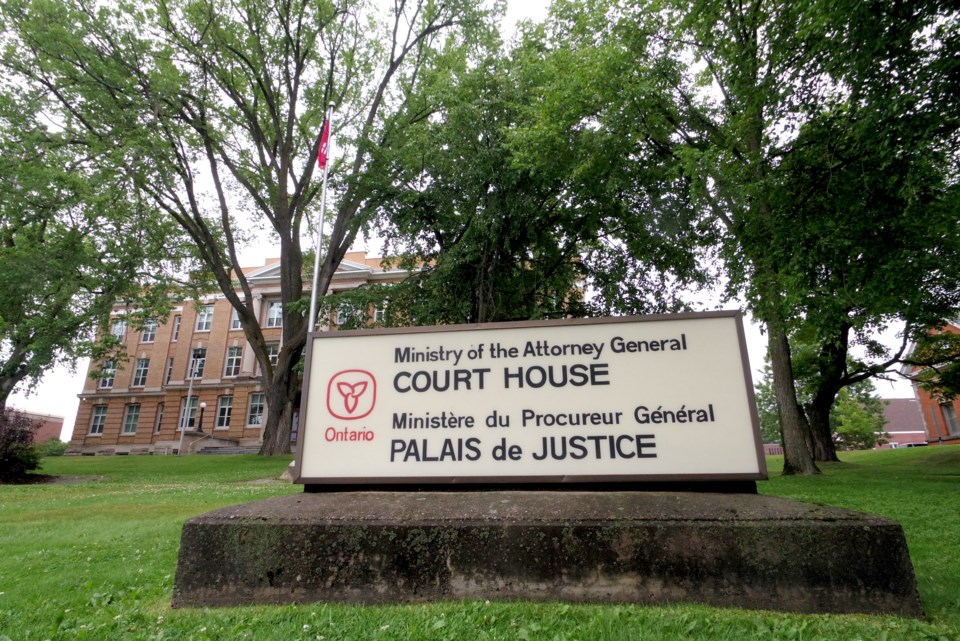Brad Southwind has been sentenced to life imprisonment in a federal penitentiary with no chance of parole for 15 years for a "brutal" unprovoked knife attack that killed his best friend six years ago.
The 28-year-old Elliot Lake man stabbed Joseph Topping 17 times — a "horrific" assault that "must have been an awful way to die," Superior Court Justice Michael Varpio said when he imposed the sentence on Wednesday.
He described Southwind as a violent individual who committed a "heinous" crime and "has little chance of rehabilitation."
The attack occurred when Southwind, who has struggled with mental health issues his whole life, was suffering from a serious drug-induced psychosis and had been abusing illicit drugs for some time.
Varpio found him guilty of second-degree murder in the death of the 31-year-old victim earlier this year.
With the 15-year parole eligibility, minus the six years he spent in pre-trial custody, Southwind will be eligible to apply for parole in nine years.
Topping's body was discovered on Feb 14, 2018 in a wooded, marshy area behind an Elliot Lake complex where the two men had apartments.
Southwind killed the man he called his best friend, who suffered from similar issues, after the victim's life began a downward spiral.
His actions had a traumatic effect on Topping's family and friends, with his unexpected death leaving them "with a hole in their lives" and causing them "considerable grief," the judge said.
In a victim impact statement his sister Laura Topping read to the court last month, she was attempting to make sense of a personal tragedy and "showed considerable empathy" for Southwind.
The young woman told her brother's killer she forgives him because that's what Joseph would tell her if he was here.
"She is to be commended for her ability to understand the humanity in all people, including the humanity in the man who took her brother's life," Varpio said.
The penalty for second-degree murder is a life sentence with parole eligibility between 10 and 25 years.
The Crown had argued that parole eligibility should be 12 to 15 years, citing Southwind's criminal record, the brutal nature of the crime, and the elements of planning involved.
The defence had called for a 10-year period of eligibility, citing Southwind's Indigenous heritage and mental health status, and also asked the judge to consider the time he has spent in pre-sentence custody.
When Varpio delivered his decision, the young man showed no emotion. He sat in a chair, flanked by two court security officers, with his head down and hands clasped in his lap.
At his sentencing hearing in July, he had mumbled some words when the judge asked if he wanted to say anything to the court.
"During Mr. Southwind's statement, it became apparent to me that his mental health concerns and his medication were such that his cognitive abilities were limited," Varpio said Wednesday.
"He struck me as an almost frail man whose mental health problems have had an effect on his physical health."
Pre-sentence and Gladue reports ordered by the court indicated Southwind was unable to participate in the process because of his mental condition.
As a result, it's difficult to assess the offender's character, Varpio said, indicating that he was able to draw certain conclusions from the evidence.
Southwind's personal circumstances to some extent are "driven by his mental illness such that his psychoses are a defining element of his character."
He has a criminal record, replete with violent crimes, including offences he committed while in custody.
"His personality features serious violent tendencies" and his "serious drug issues are related to his mental health," Varpio said.
Southwind began using alcohol and drugs at the age of 11, and has been abusing both for much of his life.
Gladue factors have also played a significant role in bringing him before the court.
He suffered from displacement, substance abuse, mental health issues, abuse and "other issues that the courts tragically encounter with far too much frequency," the judge said.
Varpio indicated he has sympathy for the defence's position that Southwind should receive a 10-year period of eligibility for parole because of his tragic history, but this position fails to adequately consider the aggravating factors.
"I do not have much, if any, hope that Mr. Southwind can be rehabilitated," Varpio said.
His criminal record, coupled with his mental health and drug relapses, suggest that the issues that underly his "behaviour will not ever be adequately addressed."
Deterrence and denunciation are paramount in this case, the judge added, indicating that he agrees with Crown that the offence was brutal with 17 separate stab wounds, inflicted with a large knife, proving Topping "met a horrifying end."
